Relations And Functions Class 11th Notes - Free NCERT Class 11 Maths Chapter 2 notes - Download PDF
In every school, each student has a unique ID number, and in the school’s database, that ID number represents the relation to that specific student. Similarly, in Mathematics, the Relations and Functions chapter discusses the connection between elements of two sets and their mapping. Also, this chapter includes the domain, co-domain, range, and graphing of a function. These NCERT Class 11 Maths Chapter 2 Notes are useful for calculus chapters (Differentiation and Integration) as well as algebra and coordinate geometry. The main purpose of these NCERT Notes is to provide students with an efficient study material from which they can revise the entire chapter.
This Story also Contains
- Class 11 Relations and Functions Notes PDF – Download Free Study Material
- NCERT Class 11 Maths Chapter 2 Notes Relations and Functions
- How to Use the Relations and Functions Class 11 Notes Effectively?
- Relations and Functions Class 11 Notes: Previous Year Question and Answer
- NCERT Class 11 Maths Notes Chapter-Wise Links
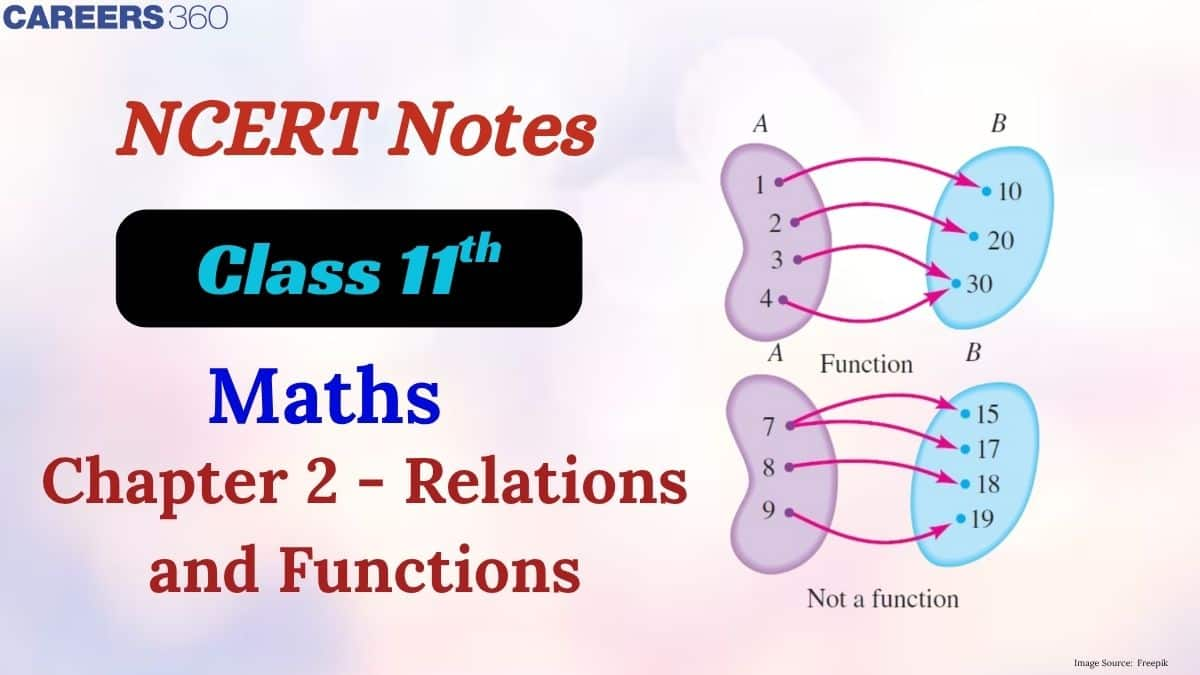
After going through the textbook exercises and solutions, students need a type of study material from which they can recall concepts in a shorter time. The Relations and Functions Class 11 Notes are very useful in this regard. In this article about NCERT Class 11 Maths Notes, everything from definitions and properties to detailed notes, formulas, diagrams, and solved examples is fully covered by our subject matter experts at Careers360 to help the students understand the important concepts and feel confident about their studies. These NCERT Class 11 Maths Chapter 2 Notes are made in accordance with the latest NCERT syllabus while keeping it simple, well-structured and understandable. Explore NCERT Books, Solutions, Syllabus, and Exemplar Problems with Solutions for complete syllabus coverage in this NCERT article.
Also, read,
Class 11 Relations and Functions Notes PDF – Download Free Study Material
Use the link below to download the NCERT Class 11 Maths Chapter 2 Notes PDF for free. After that, you can view the PDF anytime you desire without internet access. It is very useful for revision and last-minute studies.
NCERT Class 11 Maths Chapter 2 Notes Relations and Functions
Understanding how elements connect and interact with each other is at the heart of mathematics, and NCERT Class 11 Maths Chapter 2 Relations and Functions lays the foundation for just that. Careers360 has prepared these NCERT Class 11 Maths Chapter 2 Notes to make your revision smoother and faster.
Ordered Pair: Two elements form an ordered pair.
Representation: (a,b)
Note: 2 ordered pairs (a, b) and (c, d) are said to be equal if (a = c) and (b = d)
Cartesian Product
If sets $A$ and $B$ are given, then the set of all ordered pairs $(a, b)$ where $a \in A$ and $b \in B$ is called the Cartesian product of $A$ and $B$.
It is denoted by: $A \times B$
Set-builder form:
$A \times B=\{(a, b): a \in A \text { and } b \in B\}$
Note:
-
If A=∅ , B= ∅, then the cartesian product A x B=∅.
-
It doesn’t satisfy the commutative law: (A, B)≠(B, A)
-
If either of the two sets is an infinite set, then the whole product becomes infinite.
A = infinite, B = finite, then A x B and B x A are also infinite.
-
If n(A) = m (m = number of elements in A), n(B) = n, then the number of elements in the Cartesian product is mn.
Eg: n(A) = 3 and n(B) = 2 then n(A × B) = 6.
Relations
A group of ordered pairs containing one element from each set is called a relation between two sets. Suppose A and B are both non-empty sets, then the relation is a subset of the Cartesian product of (A × B).
A subset is a relation between the first and second elements of ordered pairs in A × B.
The set of first elements in relations is called the domain, and the next element is called the image or range of R.
Set builder form: R={(a,b): (a,b)∈R}
Representation of Relation

Note:
The range can be represented in set-builder form, roster form, and also using arrow diagrams with brackets.
If $n(A)=m$ (where $m$ is the number of elements in set $A$ ) and $n(B)=n$,
Then the number of ordered pairs in the Cartesian product $A \times B$ is: $m n$
The total number of possible relations that can be formed from $A$ to $B$ is: $2^{m n}$
Inverse Relation
Sets A and B are both non-empty sets with $R$ being the relation, and the inverse of the relation is called the inverse relation $R^{-1}$ from B to A.
Set builder form : $R^{-1}=\{(b, a):(a, b) \in R\}$
The domain of the relation R will be the range of the inverse relation $R^{-1}$. The range of the relation R will be the domain of the inverse relation $R^{-1}$

Functions
A relation F from A to B is called a function if every element in set A of a function has only one image in set B of a function.
A relation $f$ from a set A to a set B is said to be a function if every element of set A has one and only one image in set B.
In other words, a function $f$ is a relation such that no two pairs in the relation have the same first element.
The notation $f: \mathrm{X} \rightarrow \mathrm{Y}$ means that $f$ is a function from X to $\mathrm{Y}. \mathrm{X}$ is called the domain of $f$ and Y is called the co-domain of $f$.
Given an element $x \in \mathrm{X}$, there is a unique element $y$ in Y that is related to $x$.
The unique element $y$ to which $f$ relates $x$ is denoted by $f(x)$ and is called $f$ of $x$, or the value of $\boldsymbol{f}$ at $\boldsymbol{x}$, or the image of $x$ under $f$.
The set of all values of $f(x)$ taken together is called the range of $f$ or image of X under $f$. Symbolically.
range of $f=\{y \in \mathrm{Y} \mid y=f(x)$, for some $x$ in X$\}$
Real-Valued Functions
Function denoted as f: A→B is said to be a real-valued function if B is a subset of R. If A and B are subsets of R, in such conditions, we can call f a real function.
Type Of Functions:
Identity function:
A function is said to be an identity function if a function f: R→R when f(x)=x for each x belonging to R, satisfies.
Consider the graph of an identity function f(x)=x:
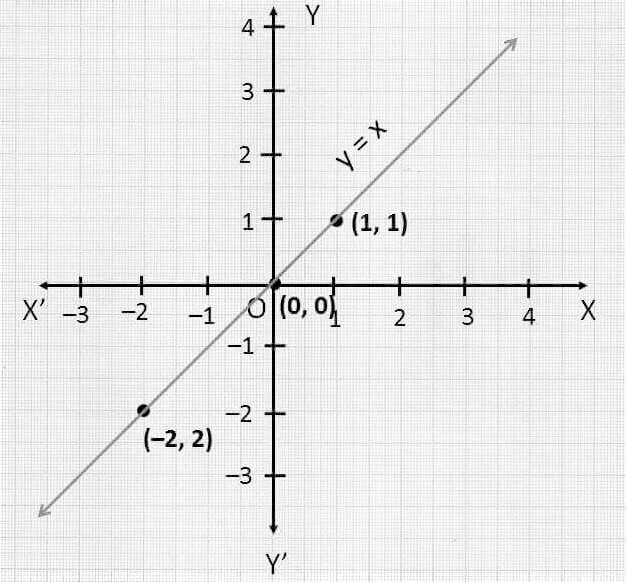
Domain= R
Range = C
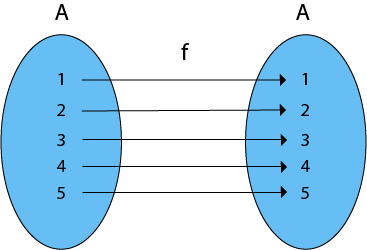
Constant Function
A function is said to be a constant function if a function f: R R when f(x)=C for each C belonging to R.
Consider the graph of a constant function:
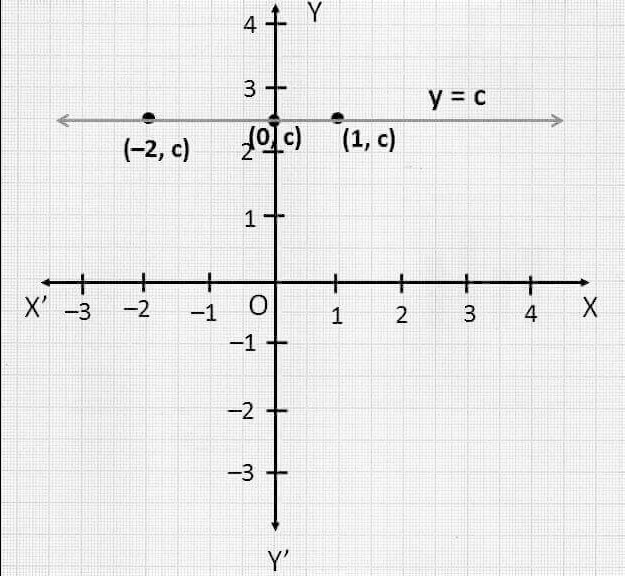
Domain= R
Range = C
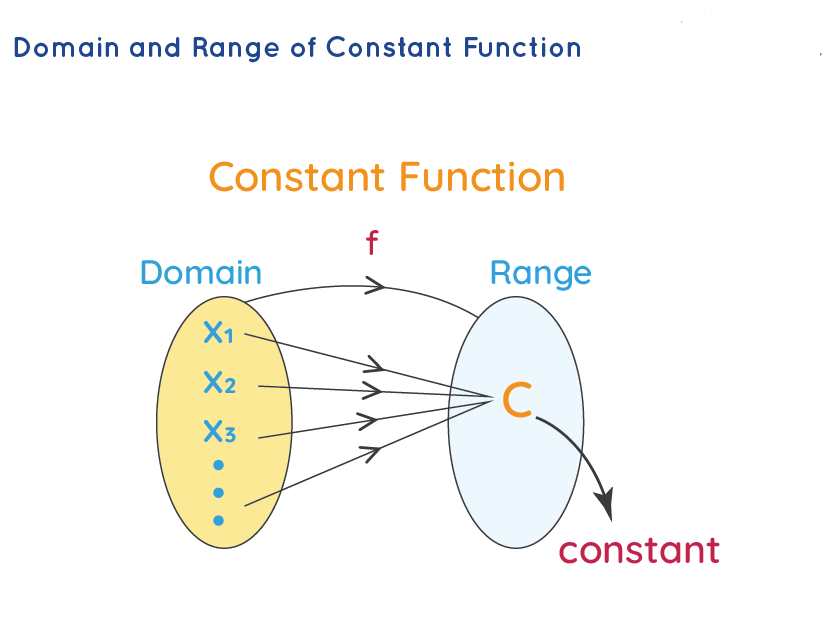
Polynomial Function:
A function is said to be a Polynomial function if a function f: R → R, when each x belonging to R, satisfies.
Rational Functions:
The functions that belong to Real functions, and are represented as f(x)/g(x) where f(x) and g(x) ≠ 0 are polynomial functions that are represented using x, and they belong to R.
Modulus Function:
Real function f: R → R is said to be a modulus function if
$f(x)=|x|$ for all $x$ belongs to R
Domain: $R$
Range: $R^{+} \cup 0$ in the interval $[0, \infty)$
$f(x)=\left\{\begin{array}{cc}-x & \text { if } x<0 \\ x & \text { if } x \geq 0\end{array}\right\}$
Signum Function:
Real function f: R → R is said to be a Signum function if f(x) = lxl / x, where x≠0 and when x = 0, we get
$f(x)=\left\{\begin{array}{cc}1, & \text { if } x>0 \\ 0, & \text { if } x=0 \\ -1, & \text { if } x<0\end{array}\right.$
Domain= R
Range={-1,0,1}
Greatest Integer Function:
Real function f: R → R is said to be the greatest integer function if f(x)=[x] where x belongs to R and values of x are the greatest integer or less than or equal to x.
Fractional Function:
Real function f: R → R is said to be a rational function if f(x)={x} where x belongs to R.
f(x) = {x} = x – [x]
Domain: R
Range : [0,1)
Algebra of Real Functions
Addition Of Two Algebraic Functions:
If f: X → R and g: X →R are real functions, then we represent: (f + g): X → R as (f + g) (x) = f (x) + g(x) where x belongs to X.
Subtraction Of Real Functions:
If f: X → R and g: X → R are real functions, then we represent : (f – g): → R as (f – g) (x) = f (x) – g(x) where x belongs to X.
Multiplication Of Scalar:
If f: X → R is a real function, K is any scalar
The product of Kf is defined by : (Kf)(x) = Kf(x)
Multiplication Of Two Real Functions:
If f: → R and g: X→ R are real functions,
The product of the two functions is defined by: (fg) x = f(x). gx)
The Quotient Of Two Real Functions:
If f and g are two real functions, then the
The quotient of f by g is given by fg from XR.
(f/g)(x) = f(x)/g(x) where g(x)≠0
How to Use the Relations and Functions Class 11 Notes Effectively?
Relations and Functions is an important chapter in Class 11 because it tells us how different values are linked and how one value depends on another. These ideas help us understand many future topics in Maths. Using your Class 11 Maths Chapter 2 notes correctly makes the chapter much easier. Here are some more points on how these notes are important.
- Read the topics in order — Introduction, Cartesian Product, Relations, and Functions — so you build the concept slowly without confusion.
- Draw small examples for Cartesian products and try forming simple relations and functions on your own while studying.
- Connect what you learn from the NCERT Class 11 Maths Chapter 2 notes to higher classes, as functions become the base for calculus and many advanced concepts in Class 12.
- Keep revising the NCERT Class 11 Maths Chapter 2 notes and solve a few easy questions after each topic to check your understanding.
Relations and Functions Class 11 Notes: Previous Year Question and Answer
Given below are some previous year question answers of various examinations from the NCERT class 11 chapter 2 Relations and Functions:
Question 1:
The domain and range of the function f given by $f (x) = 2 - \left |x -5 \right |$ is:
Solution:
Given data: $f(x)=2-|x-5|$
$\& \mathrm{f}(\mathrm{x})$ is defined by $x \in R$
Thus, its domain is $f(x)=R$
$\begin{aligned}
& |x-5| \geq 0 \\
& -|x-5| \leq 0 \\
& 2-|x-5| \leq 2
\end{aligned}$
Thus, $f(x) \leq 2$
Thus, range of $f(x)=(-\infty, 2]$
Hence, the answer is $(-\infty, 2]$.
Question 2:
Let n(A) = m, and n(B) = n. Then the total number of non-empty relations that can be defined from A to B is:
Solution:
Given data: n(A) = m & n(B) = n
Thus, n(A × B) = n(A).n(B) = mn
Thus, $2^{mn-1}$ is the total no. of relations,
Hence, the answer is $2^{mn-1}$.
Question 3:
If $f(x)=a x+b$, where $a$ and b are integers, $\mathrm{f}(-1)=-5$ and $\mathrm{f}(3)=-3$, then a and b are equal to
Solution:
Given data: $f(x)=a x+b$
Now, $f(-1)=a(-1)+b$
i.e., $-5=-a+b$
Thus, $a-b=5$
Now, $f(3)=3 a+b$
i.e., $3=3 a+b$
Thus, $3 a+b=3$
From (i) & (ii), we get,
$a=2 $ and $ b=-3$
NCERT Class 11 Maths Notes Chapter-Wise Links
For students' preparation, Careers360 has gathered all Class 11 Maths NCERT notes here for quick and convenient access.
Subject-Wise NCERT Exemplar Solutions
After finishing the textbook exercises, students can use the following links to check the NCERT exemplar solutions for a better understanding of the concepts.
- NCERT Exemplar Class 11 Solutions
- NCERT Exemplar Class 11 Maths
- NCERT Exemplar Class 11 Physics
- NCERT Exemplar Class 11 Chemistry
- NCERT Exemplar Class 11x Biology
Subject-Wise NCERT Solutions
Students can also check these well-structured, subject-wise solutions.
- NCERT Solutions for Class 11 Mathematics
- NCERT Solutions for Class 11 Chemistry
- NCERT Solutions for Class 11 Physics
- NCERT Solutions for Class 11 Biology
NCERT Books and Syllabus
Students should always analyse the latest NCERT syllabus before making a study routine. The following links will help them check the syllabus. Also, here is access to more reference books.
Frequently Asked Questions (FAQs)
Relations and Functions Class 11 Notes are very important study materials for revision. These NCERT Class 11 Maths Chapter 2 Notes are made in accordance with the latest CBSE syllabus while keeping it simple, well-structured and understandable. These notes provide everything from definitions and properties to detailed notes, formulas, diagrams, and solved examples of the chapter.
The domain of a function is the set of all possible input values (x-values) for which the function is defined.
The range is the set of all possible output values (f(x)) that the function can produce from its domain.
A relation is a connection between elements of two sets, defined as a subset of their Cartesian product. It consists of ordered pairs where each pair shows how an element from one set is related to an element of another.
For sets A and B, the Cartesian product A × B includes all ordered pairs (a, b) where a∈A and b∈B.
Use the vertical line test, if any vertical line touches the graph more than once, it's not a function.
Popular Questions
Courses After 12th
Applications for Admissions are open.
As per latest syllabus. Physics formulas, equations, & laws of class 11 & 12th chapters
JEE Main Important Chemistry formulas
Get nowAs per latest syllabus. Chemistry formulas, equations, & laws of class 11 & 12th chapters
JEE Main high scoring chapters and topics
Get nowAs per latest 2024 syllabus. Study 40% syllabus and score upto 100% marks in JEE
JEE Main Important Mathematics Formulas
Get nowAs per latest syllabus. Maths formulas, equations, & theorems of class 11 & 12th chapters
